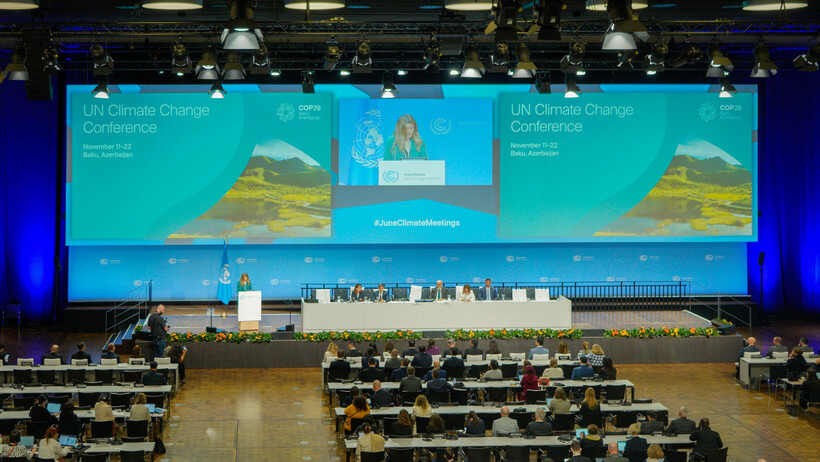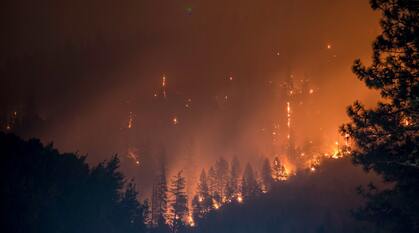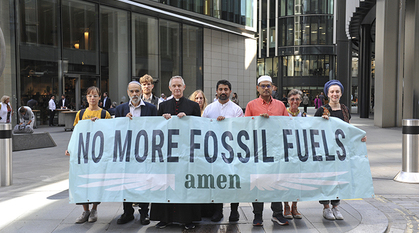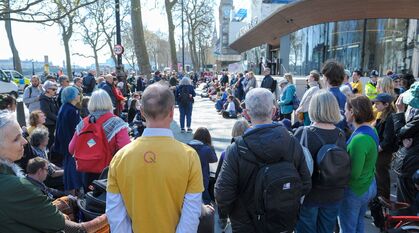COP29 – could it be a COP of peace?
The next UN climate change talks – COP29 – will begin in Baku, Azerbaijan, on 11 November 2024. Charlotte Cooper and Rebecca WalkerWoo take a look at what to expect and share an invitation to witness.

At COP29, world leaders are due to set a new global climate finance target. The last time a goal like this was set – in 2009 – 'developed nations' agreed to provide $100 billion annually by 2020 to help 'developing countries' reduce emissions and build resilience to the impacts of climate change. After much foot dragging and empty talk, the goal was eventually met in 2022.
[QUOTE-START]
Funds for military conflicts and aggressions? Available at the ready. Yet funds to save lives and livelihoods from the climate crisis are continuously delayed.
- Association of Small Island States Chair, Fatumanava-o-Upolu III Dr Pa'olelei Luteru
[QUOTE-END]
15 years on, we need world leaders to set a collective climate finance target that recognises the urgency and scale of climate breakdown. 2024 is also the year for countries to set new national climate commitments and targets to reduce national emissions. The combination of these has led to Baku being billed as the 'Finance COP'.
A COP of peace?
The Azerbaijan presidency has also said that it wants COP29 to be the first 'COP of Peace'. One component of this is a 'COP29 Climate and Peace Initiative', which aims to ensure climate finance reaches communities on the frontlines of armed conflict.
The other is an appeal for a COP truce – for parties to conflict to lay down their weapons for the month of COP – modelled on the Olympic Truce. The truce appeal recognises that “Conflicts increase greenhouse gas emissions and ravage the environment, polluting soil, water and air. The devastation of ecosystems and pollution caused by conflicts worsen climate change and undermine our efforts to safeguard the planet." It also frames the climate negotiations as a vehicle to bridge divides amidst rising violent conflict.
These initiatives have been met with caution by civil society. They are not unwelcome but activists have questioned whether Azerbaijan is seeking to 'peacewash' its reputation, given its poor human rights record, painful history of war with neighbouring Armenia, and reliance on fossil fuel revenues. Perhaps more importantly, a temporary truce (even if it succeeds) and reforms to climate finance mechanisms will not address the links between militarism and climate breakdown.
The connected crises of climate breakdown and rising war and militarism demand deep and rapid change, not tinkering at the edges.
What would a COP of peace truly look like?
Ultimately, the COP29 peace framing doesn't go far enough because it talks about conflict while staying silent on militarism. This allows wealthy and highly militarised states to make virtuous noises while steering well clear of two themes that really need to be on the agenda: military emissions and rampant military spending.
A genuine COP of peace would ensure that militaries are transparent about and accountable for their contribution to greenhouse gas emissions. A recent study estimated that the world's militaries, excluding warfighting, are responsible for 5.5% of global emissions. In contrast, all 54 countries in Africa combined are responsible for 4%. Despite this, reporting military emissions is voluntary and they are excluded from binding targets.
A true COP of peace and climate justice would also achieve commitments for ballooning military spending to be redirected to climate finance and action. Climate breakdown represents the biggest threat to the safety and wellbeing of humanity and it's not the kind you can face with a gun.
Despite this, wealthy states have been funnelling money into their militaries rather than addressing the problem. In 2023, global military spending surged for the ninth year in a row to reach $2.4tn – the same amount that the Executive Secretary of the UNFCCC says will be needed every year to support developing countries with the renewable energy transition and climate adaptation. Seven of the top ten historical emitters are also among the top ten military spenders; when these countries fail to pay what they owe in climate finance, military spending becomes a climate justice issue.
If world leaders – and our government – are serious about bringing about peace and responding to the climate crisis, the answer is simple:
- Stop spending money strengthening armies and enforcing borders.
- Start spending it repairing the harm done to our planet and paying what we owe to communities facing the worst effects of the climate crisis.
Witness for peace and climate justice
We know COP29 may feel miles away and many may be feeling deep despair at the sickening turn of conflicts around the world and the all-too-regular reminders of devastation and loss following recent mega storms. We invite everyone reading these words to pause.
Let us breathe together.
Deeply.
Slowly.
Honouring the pain we feel.
Then let us breathe again together and know we are many. In our shared community and friendship lies great strength.
[QUOTE-START]
Power concedes nothing without an organised demand.
- Charlene Carruthers
[QUOTE-END]
With grief and love in our hearts, we invite you to join us and:
- Sign our open letter to the UK government ahead of COP29 – countless communities are facing destruction and death while the polluters responsible enjoy record-breaking profits. We need the UK government to champion and commit funding to address climate-induced Loss and Damage.
- Start a conversation with your MP around climate, militarism and security – as the climate crisis deepens and conflicts rage around the world, why aren't we investing in the things that will help us to build a more peaceful and sustainable world? How can you support your MP to explore how to do this?
- Sign up to our Faith in Action newsletter to hear about future opportunities to witness for climate justice and peace.


